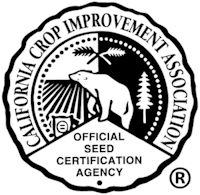Annual Member's meeting
All members are invited to attend the annual CCIA member’s meeting on May 24, 2012 at 9:00 a.m. in the Prato Room of the Parsons Seed Certification Center on the UC Davis campus. Directions to the site are available on the CCIA website; parking permits must be purchased in the parking lot for $7. If you plan to attend, please contact Kitty Schlosser by email at meschlosser@ucdavis.edu or phone 530‐752‐6979. There is no registration fee; travel and lodging expenses are the responsibility of the member.
Reminder - change in research fees
The January issue of Seed Notes reported the following changes to research fees effective April 1st:
Beans ‐ increase from $0.15 to $0.20/cwt
Small grains ‐ increase from $0.22 to $0.25/cwt
Check the CCIA web site for the full schedule of fees.
Scholarships information
The CCIA provides scholarships to students attending the major agricultural universities in California. These students must indicate an active interest and participation in the seed industry, crop improvement, crop science clubs, seed packaging, seed and plant judging contests and/ or activities related to seed production. Each university sets their own due dates and application specifics. For more information, please contact the College or Department at each school — Chico State, Fresno State, Cal Poly San Luis Obispo, Cal Poly Pomona, or UC Davis — or Robert Stewart at the CCIA, phone (530) 752‐ 9826 or email: rfstewart@ucdavis.edu.
Field days & meetings
May 2 - Seed Industry Conference Location: Harvest Hall, Modesto
This one‐day conference focus on current issues of importance to those involved in all aspects of the seed industry. The meeting is co‐sponsored by the CCIA and the California Seed Association. Registration is $60. More information is available on the CSA web site.
May 9 - Small Grains & Alfalfa Field Day Location: Agronomy Fieldhouse, UC Davis campus, Hutchison Road
The morning agenda will focus on small grains; information about alfalfa will be provided in the afternoon. There is no fee and pre‐registration is not required. Coffee, donuts, and a hamburger lunch will be served.
Staff focus - Catalina Oramas
 Catalina Oramas began work at the CCIA April 1st. She will conduct field inspections and provide support for grow‐outs and the seed lab. Catalina received a B.S. in Agronomy and a minor in Animal Sciences from the University of Cauca in Popayan, Colombia. She then moved to the United States and began work at Pioneer Hi‐ Bred International focusing on plant pathology and corn breeding. Previous to joining the CCIA, she worked with Monsanto for the Trait Field Solution group in drought corn research. Her responsibilities included data collection and regulatory compliance. In her free time she enjoys traveling, going to the movies, and spending time with family and friends.
Catalina Oramas began work at the CCIA April 1st. She will conduct field inspections and provide support for grow‐outs and the seed lab. Catalina received a B.S. in Agronomy and a minor in Animal Sciences from the University of Cauca in Popayan, Colombia. She then moved to the United States and began work at Pioneer Hi‐ Bred International focusing on plant pathology and corn breeding. Previous to joining the CCIA, she worked with Monsanto for the Trait Field Solution group in drought corn research. Her responsibilities included data collection and regulatory compliance. In her free time she enjoys traveling, going to the movies, and spending time with family and friends.
Rice Experiment Station centennial celebration
The UC/USDA Rice Experiment Station will be celebrating their centennial on August 29, 2012 at their annual field day. The station is located in the Sacramento Valley near Biggs. More information will be available in July. Contact Kent McKenzie for more information at ksmckenzie@crrf.org or 530‐ 868‐5481.
History of the CCIA - part 2
The state committee guiding the Approved Seed Plan, which by 1936 had become known as the California Farm Bureau Approved Seed Plan, became more formally organized in 1936. Five districts were formed in the state, each of which elected a grower representative. In addition to this there were appointed representatives from the Extension Service, Department of Agronomy, and the Farm Bureau. J. E. Coke remained the guiding light in the program through 1934. Mr. B.J. Jones succeeded Mr. Coke in 1935, and continued to provide the leadership of the Agricultural Extension Service. Coke and Jones, throughout the period of the state office function being with the Agricultural Extension Service, worked closely with members of the Department of Agronomy at Davis. Individuals in that department who played a prominent part in guiding the program were F. N. Briggs, G. A. Wiebe, and C. A. Suneson. The crops of primary interest still remained the small grains. However, the certification of light red kidney beans got under way in 1932 and became successful due considerably to the efforts of M. C. Collins, then Farm Advisor of Yuba County. As a result of his enthusiastic participation, seed growers in the Marysville area began to develop a market for their certified light red kidney beans in the state of New York, which found that the California seed was free of diseases, particularly bacterial blight.
The interest in certification expanded rapidly during the 30's. It became obvious that the program could not be operated indefinitely as an incidental part of the extension agronomists' activities. This was indicated in a letter Mr. Alex Johnson of the Farm Bureau sent to the University of California on February 24, 1936. He referred to a resolution by the Farm Bureau asking the College of Agriculture to assign a separate man to the Calapproved Seed Program. The program which had started in 1931 with 1,265 acres, had become by 1935 a program with 7,233 acres and 113 growers participating.
More history to come...
